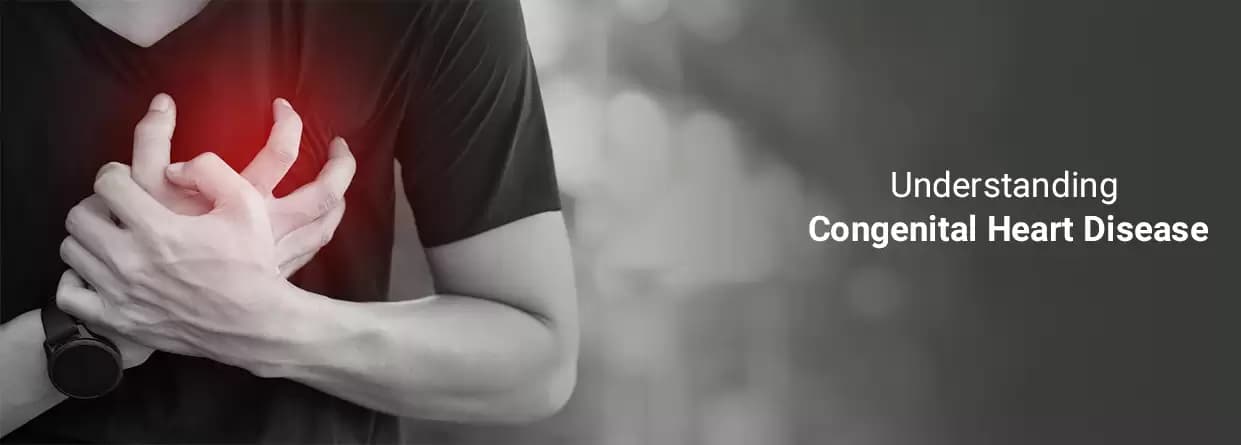
Congenital heart disease (CHD) is a heart anomaly present at birth. The condition affects heart walls, heart valves, and blood vessels. It involves several conditions that are characterised by a defect or anomaly present in the heart.
Congenital heart disease (CHD) is a heart anomaly present at birth. The condition affects heart walls, heart valves, and blood vessels. It involves several conditions that are characterized by a defect or anomaly present in the heart. Many congenital diseases are minor and don’t need treatment. Severe heart abnormalities can have life-threatening consequences. Congenital heart disease consists of conditions like aortic valve stenosis (AVS), atrial septal defect (ASD), patent ductus arteriosus (PDA), etc.
In this blog, we are going to discuss congenital heart disease comprehensively for better understanding. So, make sure to read it till the end, but understand that this write-up is for informational purposes only and doesn’t interfere with a doctor’s consultation. If you are facing any issue or problem, make sure to visit a cardiologist in Kolkata for better guidance and treatment.
The types of congenital heart disease are divided into three primary categories:
The symptoms of congenital heart disease depend upon the type of defect and its severity. The common congenital heart disease signs and symptoms include:
Congenital heart disease is a result of problems in the development and formation of the heart in the early stages of pregnancy. Congenital heart disease causes involve genetics, environmental factors, or both. Genetic causes of heart disease comprise random genetic mutations, sequence deletions, large chromosomal abnormalities such as Down's Syndrome, and small chromosomal abnormalities.
Certain infections, conditions, and environmental triggers in the mother during pregnancy are involved in the development of heart disease such as rubella infections, maternal diabetes, smoking, drinking alcohol, folate deficiency, taking certain medications like lithium, and being overweight or obese. In many cases, the exact cause of congenital heart disease is not known. It is believed according to studies that it might be due to a genetic predisposition or family history triggered by external environmental factors.
Treatment of congenital heart abnormalities depends on the diagnosis. Many children with congenital heart disease don’t need any treatment whereas some will require comprehensive and long-term care. It can heal on its own sometimes. Treatment options include:
The doctor will prescribe some medications that will assist the heart to function more effectively. Some medications are given to prevent blood clotting and control the abnormal heartbeat
Complications related to congenital heart diseases are preventable with implantable heart devices. It includes pacemakers and implantable cardioverter defibrillators (ICDs). A pacemaker helps regulate the unusual heart rate and ICD helps with life-threatening abnormal heartbeats
This treatment comprises making a small opening in the skin through which a narrow tube or catheter is inserted into a blood vessel (artery or vein). This is a less intensive procedure when compared to traditional surgery methods. Small wires or threads are passed through this tube to assist the surgeon. In this treatment option, the chest cavity is not opened. This decreases the risk of infections and makes the recovery process quicker and easier.
Open heart surgery is required to correct the disease if the catheterization option doesn’t work. Surgery is performed to close holes in the heart, correct severe valve disease, broaden blood vessels, and correct complex abnormalities such as the misplacement of cardiac blood vessels. Some children need only single surgery to correct the disease whereas for some children multiple procedures are required.
In rare cases, the doctor might recommend a heart transplant when it is suspected that congenital heart disease is hard to treat with other options.
Here are some tips that can help with congenital heart disease prevention:
Congenital heart disease is a defect in the structure of a heart present at birth. It can be suspected at birth even before a baby is born, during childhood, and soon after birth. If you or your baby is diagnosed with a heart defect, it is crucial to visit a cardiologist specializing in CHD. You must ensure frequent visits often throughout your life to evaluate the condition and keep the heart healthy.
If a congenital heart disease is left untreated, then it can enhance the risk of developing endocarditis. It is crucial to get treatment for CHD as otherwise, it can lead to life-threatening heart damage.
More than 75% of babies born with congenital heart disease are anticipated to survive for one year of age whereas around 69% of babies survive for 18 years of age. Survival and clinical care for babies with CHD are getting better.
Written and Verified by:

Dr. Ashok B. Malpani is a Senior Consultant in Cardiology Dept. at BM Birla Heart Hospital, Kolkata, with over 34 years of experience. He specializes in complex angioplasty, primary angioplasty, and pacemaker implantation.
Similar Cardiology Blogs
Book Your Appointment TODAY
© 2024 BMB Kolkata. All Rights Reserved.